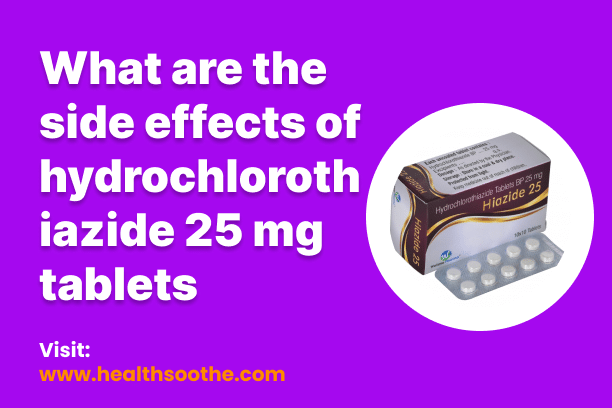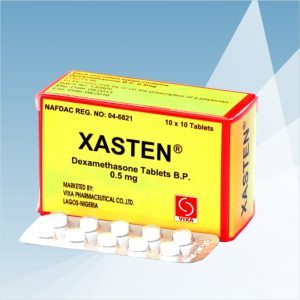Hydrochlorothiazide is a prescribed medication administered orally in tablet or capsule form. The oral tablet version of Hydrochlorothiazide is exclusively available in a generic form, typically more affordable than its brand-name counterpart.
Why it’s used
Hydrochlorothiazide is employed for the management of elevated blood pressure. Additionally, it is utilized to address edema resulting from conditions such as heart failure, liver damage (cirrhosis), and the use of medications like corticosteroids or estrogens. Furthermore, it may be effective in treating edema associated with kidney problems. This medication can be prescribed either as a standalone treatment or in conjunction with other drugs.
How it works
Hydrochlorothiazide falls within the category of drugs known as thiazide diuretics, which constitute a group of medications functioning in a comparable manner. This drug class is frequently employed for the treatment of similar medical conditions.
The precise mechanism of action of hydrochlorothiazide is not fully understood. However, it is believed to operate by eliminating excess salt and water from the body. This process, in turn, eases the workload on the heart, reducing the effort required to pump blood. Consequently, this leads to a decrease in blood pressure and alleviation of swelling.
How long it lasts
Hydrochlorothiazide generally begins to take effect after approximately 2 hours, with its peak effectiveness occurring around 4 hours after administration. The impact of the drug typically lasts for a duration of 6 to 12 hours.
In the event that your doctor advises discontinuing hydrochlorothiazide, the drug is expected to remain in your system for about 3 to 4 days following your last dose.
If you have any inquiries regarding the duration of your hydrochlorothiazide treatment or the lasting effects of the medication, it is advisable to discuss these concerns with your doctor.
Hydrochlorothiazide side effects
Hydrochlorothiazide has the potential to induce both mild and severe side effects. The following compilation outlines some of the primary side effects that may manifest during hydrochlorothiazide treatment. It is important to note that this list is not exhaustive and there may be additional side effects.
For a more comprehensive understanding of the potential side effects of hydrochlorothiazide, or guidance on managing any troublesome side effects, it is recommended to consult with your doctor or pharmacist.
More Common Side Effects
- Lower-than-usual blood pressure (especially upon standing up after sitting or lying down)
- Dizziness
- Headache
- Weakness
- Erectile dysfunction (difficulty getting or maintaining an erection)
- Tingling sensation in hands, legs, and feet
- Photosensitivity (increased sensitivity of the skin to the sun)
- Muscle spasms
- Diarrhea
These effects are generally temporary and may resolve within a few days or weeks. If they persist or become more severe, it is advisable to consult with your doctor or pharmacist.
Serious Side Effects
Contact your doctor immediately if you experience serious side effects. Seek emergency medical attention by calling 911 if you believe your symptoms are life-threatening or if you think you are having a medical emergency. Serious side effects and their associated symptoms include:
- Severe skin reactions such as Stevens-Johnson syndrome and exfoliative dermatitis, characterized by:
- Painful skin rash
- Skin peeling and blisters
- Fever
- Mouth sores
- Kidney failure, with symptoms like:
- Weakness
- Shortness of breath
- Tiredness
- Confusion
- Abnormal heart rate or chest pain
- Reduced urine production
- Increased swelling in legs, ankles, or feet
- Blurred vision, accompanied by:
- Eye pain
- Difficulty seeing
- Pancreatitis (inflammation in the pancreas), presenting symptoms such as:
- Upset stomach or vomiting
- Severe stomach or back pain
If you encounter any of these serious side effects, it is crucial to seek prompt medical attention.
Read Also: Flexeril Tablet - Uses, Side Effects, and More
Pros and Cons of Hydrochlorothiazide
Pros of Hydrochlorothiazide
- Effective Blood Pressure Management
- Edema Relief
- Diuretic Action
- Generic Availability
Cons of Hydrochlorothiazide
- Electrolyte Imbalance
- Dehydration
- Photosensitivity
Differences Between Hydrochlorothiazide and Ardosons
Hydrochlorothiazide
Hydrochlorothiazide is a diuretic used primarily for blood pressure management and edema,
Ardosons
Ardosons is a combination medication with corticosteroids and an antihistamine used for various inflammatory and allergic conditions.
Alternative to Hydrochlorothiazide
Chlorthalidone
Similar to hydrochlorothiazide, chlorthalidone is a thiazide-like diuretic often prescribed for hypertension. It has a longer duration of action compared to hydrochlorothiazide.
How to take hydrochlorothiazide
The prescribed dosage of hydrochlorothiazide is determined by various factors, including:
- The type and severity of the condition being treated.
- Age of the individual.
- The form of hydrochlorothiazide being taken.
- Any other existing medical conditions, such as kidney damage.
Typically, doctors initiate treatment with a low dosage and make adjustments over time to achieve the optimal dose for the individual. The aim is to prescribe the smallest effective dosage.
Below are details regarding the forms, strengths, and dosages commonly used or recommended. It's important to strictly follow the dosage prescribed by your doctor, as they will tailor it to your specific needs.
Forms and Strengths:
- Generic: hydrochlorothiazide
- Form: oral tablet*
- Strengths: 12.5 milligrams (mg), 25 mg, and 50 mg
Dosage for High Blood Pressure:
- Adult dosage (ages 18 to 64 years):
- Typical starting dosage: 25 mg taken orally once daily.
- Dosage increases: If blood pressure remains elevated, the doctor may increase the dosage to 50 mg per day, given as a single or two divided doses.
- Child dosage (ages 12 to 17 years):
- Typical starting dosage: 25 mg taken orally once daily.
- Dosage increases: If the child's blood pressure stays high, the doctor may increase the dosage to 50 mg per day, given as a single dose or two divided doses.
- Child dosage (ages 3 to 11 years):
- Typical dosage: 0.5 to 1 mg per pound per day, taken once or twice daily.
- Maximum daily dosage: 100 mg.
- Child dosage (ages 6 months to 2 years):
- Typical dosage: 0.5 to 1 mg per pound per day, taken once or twice daily.
- Maximum daily dosage: 37.5 mg.
- Child dosage (ages 0 to 6 months):
- Typical dosage: Up to 1.5 mg per pound per day, taken orally in two divided doses.
- Senior dosage (ages 65 years and older):
- No specific recommendations, but older adults may metabolize the drug more slowly. A lower dosage or different dosing schedule may be needed.
Dosage for Edema:
- Adult dosage (ages 18 to 64 years):
- Typical dosage: 25 to 100 mg each day, taken orally as a single or divided dose.
- Intermittent therapy: Some individuals respond well to intermittent therapy, taking the drug every other day or for three to five days each week.
- Child dosage (ages 12 to 17 years):
- Typical dosage: 25 to 100 mg each day, taken orally as a single or divided dose.
- Intermittent therapy: Similar to adult dosing, intermittent therapy may be considered.
- Child dosage (ages 3 to 11 years):
- Typical dosage: 0.5 to 1 mg per pound per day, taken once or twice daily.
- Maximum daily dosage: 100 mg.
- Child dosage (ages 6 months to 2 years):
- Typical dosage: 0.5 to 1 mg per pound per day, taken once or twice daily.
- Maximum daily dosage: 37.5 mg.
- Child dosage (ages 0 to 6 months):
- Typical dosage: Up to 1.5 mg per pound per day, taken orally in two divided doses.
- Senior dosage (ages 65 years and older):
- No specific recommendations, but adjustments may be necessary due to potential slower drug metabolism in older adults.
Conclusion
The appropriate dosage of hydrochlorothiazide is determined based on various factors, including the specific condition being treated, the individual's age, the form and strength of the medication, and any existing medical conditions such as kidney damage. Typically, a gradual approach is taken, starting with a lower dosage and adjusting it over time to achieve the desired therapeutic effect.
It is crucial for patients to strictly adhere to the prescribed dosage and follow the guidance of their healthcare provider. Additionally, for individuals with questions or concerns regarding their hydrochlorothiazide treatment, consulting with their doctor or pharmacist is essential to ensure optimal and safe usage. Overall, the personalized and cautious approach to dosing reflects the commitment to providing effective and tailored medical care.



